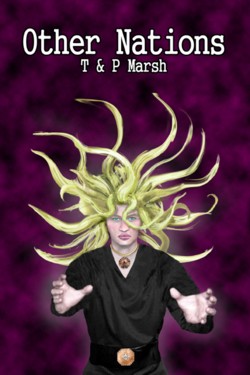Other Nations
Originally for Raw, New Things #14, 10/31/2004

Other Nations draws some elements on August Derleth's Trail of Cthulhu stories; Clairborn Boyd appears in person, although his daughter, Clara Boyd, is the primary focus for two or three chapters of the novel. Generally, it springboards off a more modern interpretation of the events in Innsmouth, as well as taking bits and pieces from Lin Carter's work, primarily the creatures called Yuggs.
Other Nations is divided into six chapters, and the first five chapters are engagingly written. If they don't exactly live up to Lovecraft's visions of cosmic horror, they are at least readable, and they do pose some interesting thoughts and questions. The Marshs' prose style is readable, and it performs some interesting shifts in the point of view.
Unfortunately, it's the sixth chapter, the one that take up more than a third of the book, that ultimately bogs the entire thing down. After reading more than three hundred pages of the novel, I simply couldn't force myself to see it through to the end. We are literally presented with hundreds of pages of philosophical discussion about how the what yuggs are, how they are different from deep ones, how their hive-mind works, how something that's a couple of million years old can appear completely human, and what a perfect civilization they have, especially when compared to humans.
It's the idealization of the nonhuman civilizations that appeal in any way to a human that makes me cringe. My friend and co-author, Dr. Ragan, is an anthropologist, and she has told me a great deal about the tremendous variations in human culture. To expect that anyone will immediately understand and assimilate the quirks of a distant foreign culture is laughable. An alien civilization is this to the nth degree, especially Lovecraftian aliens. And the concept that the Deep Ones and Yuggs are not in fact malicious simply leaves me cold. Certainly I can visualize a novel in which otherworldly creatures are the protagonists, but the an their culture need to be at least foreign. In Other Nations, the Deep Ones just want to breed peacefully with humans. The Deep One hybrids here are normal-looking, even charismatic. It turns out that they are content to bide their time and influence humanity into making the world a less-polluted place. Innsmouth, it is claimed was an aberration. Deep Ones turn out to be nice people, with nice, middle-class values.
What hampers this book is a failure of cosmic vision. Lovecraft read much, and extrapolated that strangeness into creatures that were literally incredible, and succeeded in making them so alien in their bizarreness that they had to be believed. The use of Lovecraftian elements as social commentary is almost always doomed to failure. Certainly Lovecraft himself did so in Mountains of Madness, and our own Mr. Drake did so very well in "Than Curse the Darkness", but these are extremely rare exceptions. The entities of the Mythos should be just on the edge of human comprehension, not something that sane, rational people cleave to as some sort of idealized liberal civilization; far-sighted and interested in the future welfare of all.
Where is the horror? Or even the wonder? If we reach and discover that the alien is really a nice person, that they're really not all that alien, then this book has very little to do with Lovecraft. I am glad I read as much of Other Nations as I did, because it is important to know not just what Lovecraftian is, but also what it is not. With a lack of cosmic otherness, there is no need to tie this into Lovecraft's work. The deep ones and yuggs could be replaced with virtually any other secret organization bent on taking over the world; Nazis, the Yellow Peril, Communists, or any original peril that the author's fevered mind could construe. It's a disappointing read, because there is potential in the first five chapters. But the last one just bogs down to the point where I gave up.
If I couldn't finish Other Nations, I could barely start Ray Emerson's Riddle of Cthulhu. I should have known when I opened the book and discovered that my flake of a former landlord was the editor that I was not dealing with the highest quality of Mythos pastiche in the world, but by the time I'd learned this, I had already purchased the book. Originally published as the Charybdis Memorandum in 1997, it involves a mawkish story about a private investigator and the love of his life, their DNA, and the seeds of Cthulhu that have been sewn on this planet from some sort of passing asteroid. The Government, naturally, knows all about it.
The prose is stilted and amateur. The plot, at least the first quarter of the book, after which I gave up, is unspeakably dull. I've tacked this review onto the last one because I feel bad giving it its own review when I haven't even read it. But I will tell the rest of the EOD: if this book is recommended to you, do not pick it up.